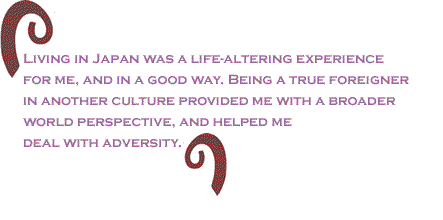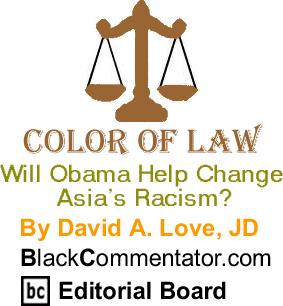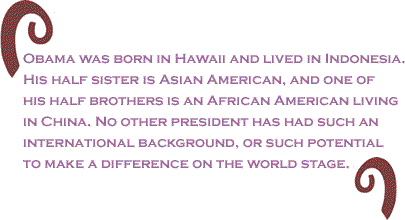
|
||||||||||||||||||||||
|
||||
 |
||||
For the nations that were a part of President Obama�s recent Asian tour, surely this was a new experience for them. For the first time, they greeted and hosted the most powerful person in the world, one of the most brilliant people they�ve ever met. And for the first time, that person is a man of African descent. It has been a long journey since the 1955 Bandung Conference, that historic meeting of African and Asian states striving for self-determination and against colonialism. Meanwhile, black people today are often stereotyped in Asian countries as dirty, violent, mentally deficient and otherwise inferior - not unlike the ways in which the West has portrayed people of color for years.
But for Asian nations, white skin was the traditional standard of beauty and prosperity. In the old days, the poorer folks were darker because they had to work in the fields, where they were exposed to the sun. As China welcomes Obama, the nation is forced to deal with its long-standing prejudices toward black people. But the discrimination is internal as well. The Chinese government has been heavy-handed in its treatment of the country�s aggrieved Uighur Muslim minority, and has waged cultural genocide against the people of Tibet. In India, the caste system, although officially banned, still lives on. Brown and black faces predominate in this nation of over 1 billion people. However, white skin is desirable, and skin whitening creams are popular. And Japan has had a longstanding problem with racism and xenophobia. Even today, one can find signs that say �No Foreigners Allowed� and �Japanese Only�, or a recent TV commercial depicting President Obama as a monkey. In 2005, Doudou Diene, special rapporteur of the UN Commission on Human Rights, found that discrimination in Japan is �deep and profound.� He added that �This xenophobic drive is expressed by associating minorities, certain minorities, to crime, to violence, to dirt.� These Japanese sentiments do not apply solely to foreigners and foreign workers. Despite its self-portrayal as a homogeneous society, Japan has its own minority groups that historically have been regarded as inferior. For example, the Ainu, an indigenous ethnic group, has suffered from displacement and cultural assimilation, higher levels of poverty and unemployment, and lower levels of health and education. Over 1 million Japanese of Korean descent - products of Japanese wartime colonization and forced labor - are treated as foreigners in the country of their birth. They face a �hidden apartheid�, in which they face discrimination in housing and employment, and feel pressure to change their Korean names and blend in society. Further, the Burakumin are an outcaste group similar to the untouchable caste in India. They face discrimination because their feudal ancestors held occupations such as butchers, tanners and gravediggers - death-related jobs that were considered tainted and unclean under Buddhist and Shinto practices. The topic of racial attitudes in Asia has fascinated me for a long time. In high school, I traveled to Japan as an exchange student and lived with a family in Tokyo. I majored in East Asian Studies in college, and wrote my thesis on Japanese perceptions of foreigners. After college, I worked as one of a handful of gaijin (foreigners) in a Japanese bank, and later for the Tokyo office of a major U.S. advertising agency. Living in Japan was a life-altering experience for me, and in a good way. Being a true foreigner in another culture provided me with a broader world perspective, and helped me deal with adversity.
Overall, my Japan experience was positive. It took some time to get used to the stares, or the occasional child who wanted to touch my skin or hair. Then there were the people who assumed I was a hip-hop entertainer, or a baseball player, or some other racial stereotype of a black man in Japan. Clearly, there was an embrace of black culture in Japan. The music and swagger of black people permeate international popular culture. And as I went to work in my business suit on the Tokyo subway, I couldn�t help but laugh to myself as I passed by Japanese teenagers sporting their dreads, hip-hop gear and Afrocentric t-shirts. But at the same time, I had to endure my fellow employees at the company dormitory. Some employees at the bank had the idea to throw a party, in which everyone would come dressed in blackface. After I protested, they cancelled their plans, but only after lecturing me about the need for foreigners to understand Japanese culture.
BlackCommentator.com Editorial Board member, David A. Love, JD is a journalist and human rights advocate based in Philadelphia, and a contributor to The Huffington Post, theGrio, The Progressive Media Project, McClatchy-Tribune News Service, In These Times and Philadelphia Independent Media Center. He also blogs at davidalove.com, NewsOne, Daily Kos, and Open Salon. Click here to contact Mr. Love. |
||||
 |
||||
If you would like to comment on this article, please do so below. There is a 400 character limit. You do not need a FaceBook account. Your comment will be posted here on BC instantly. Thanks. Entering your email address is not mandatory. You may also choose to enter only your first name and your location.
|
||||
Thank you very much for your readership. |
||||
| Any BlackCommentator.com article may be re-printed so long as it is re-printed in its entirety and full credit given to the author and www.BlackCommentator.com. If the re-print is on the Internet we additionally request a link back to the original piece on our Website. | ||||
| |
||||
| November
19 , 2009 Issue 351 |
| Executive Editor: Bill Fletcher, Jr. |
| Managing Editor: Nancy Littlefield |
| Publisher: Peter Gamble |
| Est. April 5, 2002 |
| Printer Friendly Version in resizeable plain text format |
 |

|
 |
| |
| |













































